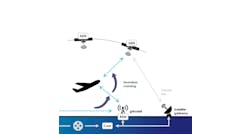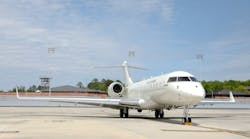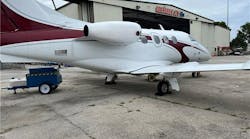Viasat told investors Wednesday that it is continuing to investigate what happened to the antenna of its newly launched $700 million ViaSat-3 Americas satellite and warned of the potential impact the incident could have on its space satellite business as future launches have been delayed.
Mark Dankberg, CEO of Viasat, said "plans are well underway" to evaluate and address the unexpected challenges posed by the problem with the ViaSat-3 Americas satellite, which blasted into space on April 30. He said the company is searching for the root cause behind the antenna's failure to deploy, assessing the antenna's current status, looking at potential improvements and what it means to Viasat's global strategy.
The satellite had climbed to its orbital slot some 22,000 miles above Earth and was expected to undergo testing before beginning to beam Internet bandwidth to customers this summer.
However, the antenna — which was supposed to act like an amplifier to help give the satellite 1,000 gigabits per second capacity — experienced an unexpected event during deployment, the company disclosed last month. Now, the company said it is still investigating the "antenna anomaly" and will provide updates next fiscal quarter.
The company said the satellite's antenna problem does not iaffect any of its existing customers or users.
Viasat has been expanding its satellite power to compete in the space-based Internet market with Elon Musk's SpaceX Starlink fleet, Amazon, OneWeb and others. The ViaSat-3 Flight 1 was the first launch in a constellation of small satellites, including two that are being worked on called Flight 2 and Flight 3.
The company did not disclose the name of the antenna manufacturer but described it as a large aerospace and defense company with experience in big antennas. Dankberg said that the second satellite, Flight 2, uses the same antenna whereas the third satellite, Flight 3 uses an antenna from a different maker.
During the call, investors pressed for details about the potential fiscal and operational impact on the company if the Flight 1 antenna malfunction is a bigger issue. Executives said that the situation has delayed its plans to launch more broadband satellites.
While the issues with Flight 1 aren't expected to have a significant financial impact on 2024, the company said it is preparing for it to affect 2025. It would specifically hit Viasat's satellite services segment.
In its fiscal 2024 first-quarter results released after the market closed on Wednesday, Viasat reported revenue of $780 million, up 36 percent compared to the same period last year. The company also reported a $77 million net loss for the quarter, which it attributed to higher interest expenses and costs related to a major acquisition.
At the end of May, Viasat closed its $6.1 billion acquisition of London-based Inmarsat, which expanded its global reach and added satellites to its fleet. Together, Viasat has 13 Ka-band satellites in space with another eight under construction, including ViaSat-3 Flight 2 and Flight 3.
This story originally appeared in San Diego Union-Tribune.
©2023 The San Diego Union-Tribune. Visit sandiegouniontribune.com. Distributed by Tribune Content Agency, LLC.



